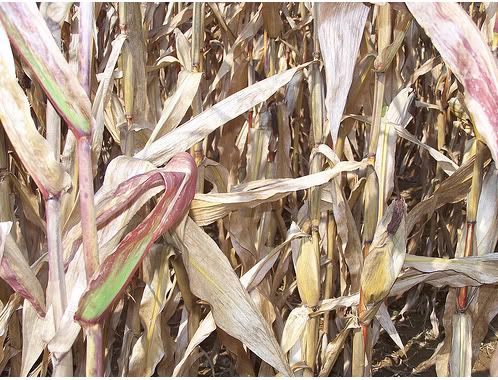
A Midwestern state ferments a new brew with a $150 million investment in new bio energy
technologies
Governor Jim Doyle plans to invest $150 million over the next ten years to help switch the Midwest state over to home-grown renewable fuel and electricity, powered by the next generation of bio energy: beyond corn ethanol. His goal is for the state to get 25% of its fuel, and also 25% of its electricity from renewables by 2025. Estimates are (Sierra Club podcast) that the electricity generation alone could generate nearly $1 billion for the state's economy.
The funding is to develop new biofuels and methane electricity from many diverse sources that, unlike food for fuel crops, don't compete for food and water supplies.
So the "next gen" funding promotes many new ways of making ethanol: from municipal solid wastes, agricultural wastes, forest residues, sewage sludge and even whey wastes from dairy farms, rather from corn or other foodstocks, that need precious water.
Even an existing pulp and paper manufacturing plant is being adapted to make energy as well as paper.
Novel biodiesel projects are also funded: including finding ways to make biodiesel from animal and vegetable waste, from algae, and even from the waste oil in corn-ethanol plants. A 10,000 gallon a year biodiesel factory gets help to use waste biomass (wood from building sites) for fuel.
One of the more unusual processes funded is a clean way for restaurants to use waste vegetable oil as fuel to heat water on-site.
Methane energy gets a boost to convert a wastewater treatment plant into a biogas renewable energy farm, and to make anaerobic digesters 90% more efficient at converting cow farm methane to energy.
Finding ways to prevent biodiesel from freezing in winter (so important in this northern state!) and developing enzymes that increase ethanol yield in current plants both get funding. One startup gets help to develop a handheld, biofuel water analyzer to test water percentages in any biofuels.
Governor Jim Doyle believes that the initial round of $7 million in funding will generate an additional $44 million investment from industry and ultimately help Wisconsin capture 10% of the market share for renewable bio energy.
The technologies funded are not all about bioenergy: Several startups making lithium battery-related technologies are included. One company is making light pipes that can funnel sunlight into commercial buildings. Another is perfecting solar skylight and window coatings. Another factory is being adapted to making parts for wind turbines.
But most interesting is how many of these startups funded in this corn-belt state are still biomass related, yet "next-gen" --- that is, moving beyond corn-based ethanol energy itself, which, while good for local farmers, is widely criticized as not sustainable in a food and water constrained world.
The full list of innovative new green companies, startups and R&D projects funded is at GreenCarCongress.
Photo from flikr user C Slizz


